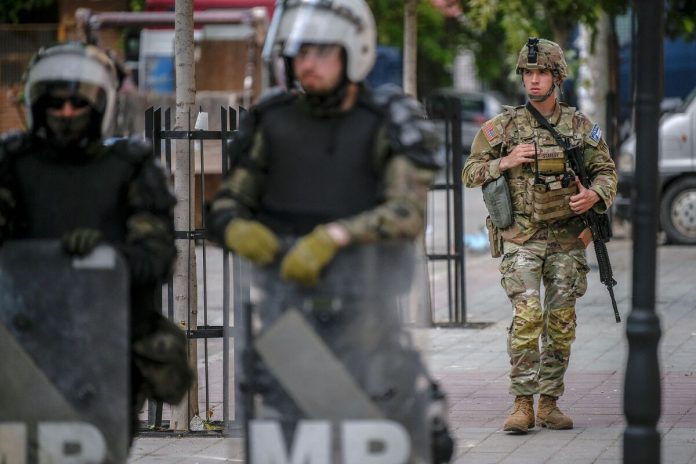At the last round of talks between Kosovo and Serbia on 14 September, Aleksandar Vucic accepted a draft agreement on Serb autonomy proposed by EU High Representative for Foreign Affairs and Security Policy Josep Borrell and his Balkan envoy Miroslav Lajcak.
However, Albin Kurti, Kosovo’s prime minister, did not support this agreement. By then, Brussels had become so frustrated with Kurti’s stubbornness that it had already begun to consider imposing sanctions on the Kosovars.
Kurti’s decision to send riot police and Special Forces into the Serb-populated northern regions to install mayors with less than 2 per cent of the local population voting for them also failed to gain support in the West. These actions were not even endorsed by Kosovo’s main international ally, Washington. On the contrary, Vucic’s praise was muted, with reports of ammunition shipments to Ukraine via third countries being credited, as well as coming close to sacking the pro-Moscow head of the Security and Information Agency (BIA), Aleksandr Vulin.
However, things soon changed.
On 24 September, a group of thirty armed Serbs blocked a road in the village of Banjska, on the outskirts of Zvecan in northern Kosovo. The exchange of fire with the Kosovo police resulted in the death of one officer and several injured. The situation escalated when the Kosovars sent in additional forces. Three of the heavily armed Serbs were shot dead. The police detained six more Serbs and seized a large cache of weapons from the nearby Baniska monastery. The rest of the group withdrew to Serbian territory after negotiations with the authorities.
The incident, which was the most serious instance of Serbs clashing with police in Kosovo in recent years, turned the tables on Vucic. In this violent incident, Kurti considers Serbia the main culprit in the deadly shootout. He wrote on social media:
“Organised crime with political, financial and logistical support from officials in Belgrade is attacking our country.”
Interior Minister Xhelal Svečla reports that a huge amount of equipment and weapons were found in the monastery, enough to organise a mass uprising. In response, Vucic merely stated that responsibility for the bloodshed lies with Kurti, who provoked the “revolt” of Kosovo Serbs with his harsh policies.
Belgrade has a version of the reason for the situation. Kosovo Serb leaders are seeking to get out from under Vucic’s control. Thus, this skirmish in which Serbia can be blamed only indirectly.
Kosovo authorities have noted the possible involvement of Milan Radojčić, deputy chairman of the northern-dominated Serbian party Srpska Lista, in the conflict. Video evidence of his presence at the scene of the shooting appeared on the Internet. However, Radojčić soon mysteriously disappeared from the monastery, along with most of the thirty militants. There is speculation that the withdrawal was negotiated and mediated between the Kosovo forces of order and the heavily armed Serbian contingent by US embassies.
According to Vucic’s 27 September interview with national broadcaster RTS, Radojcic is somewhere in central Serbia. The Serbian leader remains in his opinion: It’s all the Kosovars’ fault – they started it first.
However, if the story about Radojcic’s freelance work turns out to be true, it turns out that Vucic is no longer in control of his former confidants, who are now ruining the whole system he had established. Perhaps the strongman is giving in to the local players who used to seek his patronage.
If such politic figures like Radojcic can govern the Serb community of North Kosovo, it is not only a problem for Vucic, but also a problem for the EU, which is trying to achieve a negotiated settlement in Kosovo.
If Belgrade does not coordinate with local Serbs, Brussels has a problem. Local leaders have no motivation to support any EU settlement plans. They favour the status quo and are likely to fight to keep it as it is. Vucic is in danger of losing his importance in the state. This could be a reason for the dialogue in Brussels to stop.
Against the backdrop of the war in Ukraine, the EU has sought to finally resolve the status of Kosovo. It almost achieved this by signing the Ohrid Agreement in March 2023, which ultimately was signed by neither Kurti nor Vucic.
The EU is now on the verge of another mini-crisis. As long as these recurring crises dominate the headlines, Borrell and others in Brussels will play a game of tug-of-war, i.e., to contain violence here and there, prevent the outbreak of an even larger conflict, and keep Serbs and Albanians apart.
The main prize – Serbian recognition of Kosovo in exchange for some form of Serb autonomy – remains, as always, out of reach. The more such incidents occur, the less likely Serbia and Kosovo will be willing or able to compromise. The EU will not be able to solve the problem – perhaps only to manage and contain it. This negative scenario is very likely in Kosovo. That is why Brussels should gather all its forces and put pressure on Serbia and Kosovo to shake hands, finalise and implement the agreement.
The EU should keep its eyes open.
